Load Newsreader Bold Font
Content is king.
It’s the most effective way to move someone along the customer journey from having never heard of your brand to booking or purchasing from you.
Whether you’re trying to optimize your Showit website for search engines or just trying to become a better marketer, one of the best skills a business owner can develop is to learn how to conduct keyword and content research.
It’s not just an important skill to learn for SEO (search engine optimization). Effective content and keyword research will help you better understand your audience, increase traffic to your website, and engage your target audience.
What is keyword research?
Keyword research is the process of researching popular terms and phrases that people enter into search engines so you can then strategically use them in your content and copy. In doing so, you’ll (hopefully) rank higher in Google searches and more effectively attract your target audience.
SEOs (professionals who help businesses with their SEO) don’t focus on keywords in the same way they once did (“entities” has become the new buzzword in SEO). For instance, it used to be a popular strategy to “stuff” the keyword as many times as possible into the page or post you were using to target that keyword. Google frowns upon that strategy because it often leads to content that is not helpful for the searcher.
Google has become increasingly better at understanding related ideas, context, and search intent. If I search the term pizza, Google understands that I am probably looking for a local pizza restaurant rather than information about pizza as a topic (such as the history of pizza).
Additionally, Google understands variations in queries such as Philadelphia wedding photographer, wedding photographer in Philly, and wedding photographers Philadelphia are essentially the same search. There’s no need to make sure you repeatedly use “exactly the right keyword” in a given article. Although, paying attention to what people are searching is still important.
Why is keyword research important?
Most of the conversation around keyword research centers on SEO, or the process of optimizing content so that it’s more likely to appear in the Google search results for a given search.
However, keyword research has additional benefits, too:
- Marketing insight. Keywords give valuable insight into things like what questions and topics for which your audience is searching and search trends. Are certain searches seasonal? What questions do consumers ask about your product or service? What words do consumers use to describe your product or service? All of these questions can be answered while doing keyword research.
- Increased site traffic. Conducting keyword research will help you optimize the pages and posts on your website to rank higher in searches. Up to 92% of people don’t look past the first page of Google. Landing on the first page of Google—especially near the top—can substantially boost your website visitors.
- More conversions. The marketing insight you gain around the customer journey will help you meet people where they are at. An important part of keyword research is understanding search intent, or the purpose of someone’s search (for instance, whether they’re looking to purchase a product or simply wanting to learn more information about a topic). When you meet people where they’re at, you’re more likely to get them to take the next step in the customer journey.
- Become a better marketer. We’ve long preached that people become better marketers when they understand SEO because learning SEO is primarily about learning how to create compelling content.
- Never run out of content ideas again. Even learning just the basics of keyword research will help you create a never-ending list of content ideas. You’ll never lament again: “I just don’t know what to blog about!”
Keyword research is one of the most reliable ways to create compelling content month after month and thus drive more traffic to your website.
What tools should I use for keyword research?
Best paid keyword research tools
SurferSEO is one of my new favorite SEO tools. Their keyword research tool and content editing tool, in particular, are intuitively designed and easy to use. Unlike other all-in-one SEO tools, SurferSEO provides a more directed, streamlined experience when it comes to search engine optimization and content creation.
SurferSEO is a great tool for small teams and solopreneurs to consider if they have some money to invest in SEO or content tools.
The next two tools are geared towards SEO professionals.
SEMrush is an all-in-one SEO tool that can help you audit your website, research keyword and content ideas, analyze backlinks and so much more. We think SEMrush’s keyword research tools are straightforward and easy-to-use, and it’s probably our favorite all-in-one professional tool.
Ahrefs’ free keyword tool does a pretty good job of providing a foundation of keyword research, giving you the difficulty and monthly search volume for your query and 10 related keywords. However, the paid version provides so much more. Ahrefs goes into great detail about each keyword, listing traffic potential, SERP features, and exactly how hard it might be to rank for the keyword.
Many of Ahrefs tools are considered “best in class,” especially when it comes to backlink and competitive analysis. It’s a very popular tool among SEO professionals.
Personally, we don’t think Ahrefs plans/pricing are structured in a way that makes sense, so we don’t use the tool as heavily.
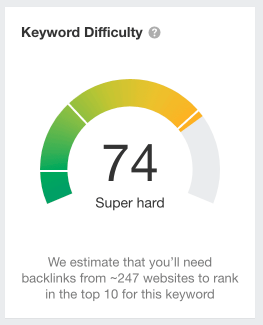
Best free keyword research tools
With the free version of this extension you can do a quick search and discover related keywords, People Also Search For keywords, and long-tail keywords. If you want any sort of data regarding keywords—like monthly search volume (MSV), competition, and 12-month trend data—you’ll need to purchase credits.
KE uses a credit for each piece of data it provides, but the credits are extremely affordable and go a long way. If you only want to pay for one keyword research tool, you’ll definitely get the best bang for your buck with this one. It’s quickly become one of the most popular “free-mium” tools out there.
SEO Minion has become one of my new favorite SEO tools. Specifically, I like that it provides an easy way to download search engine result page (SERP) data. For instance, if I want a copy of the People Also Ask (PAA) data, I can download it quickly to a CSV, even without clicking into the results to see more.
SEO Minion’s also has a number of on-page analytics tools that can be helpful when optimizing your existing content or conducting competitive analysis.
Like Keywords Everywhere, it’s a browser extension (works on Chrome and Firefox). Even if you’re budget only allows for Keywords Everywhere and SEO Minions, that’s more-than-enough data to create optimized data.
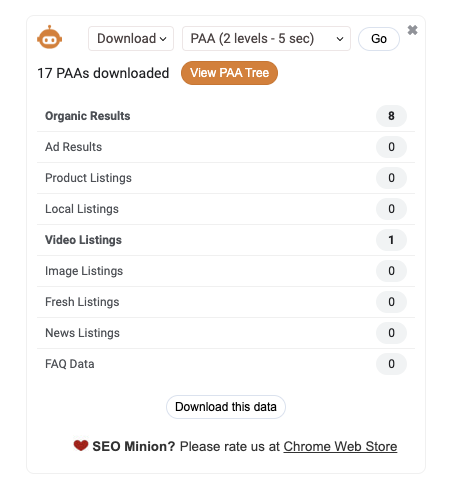
- SEMrush, Ahrefs, Moz, etc. (free, limited use accounts)
Many paid tools either have “free” plans that grant limited access to their tools. For instance, you might get 10 free keyword searches per month. These plans are always being modified, so it’s best to check with different tools on a regular basis.
- The Google Suite: Google Analytics, Google Search Console, Google Keyword Planner, and Google Trends
Google provides access to many free tools that not only are helpful when researching content, but also better understanding your own website and website visitors.
Google Search Console, for instance, is one of my favorite tools for finding keyword opportunities. Search Console will give you in-depth data about what searches your website appears for, your average ranking, click through rate, and more.
With Google’s Keyword Planner you can research keywords and gather much of the same information about it that you would if you were using a professional tool. However, the data is not as streamlined and it’s meant for use by professionals who are running Google ads.
To give you an idea of what you would find there, here are some suggestions I was provided when searching for ‘meal delivery.’
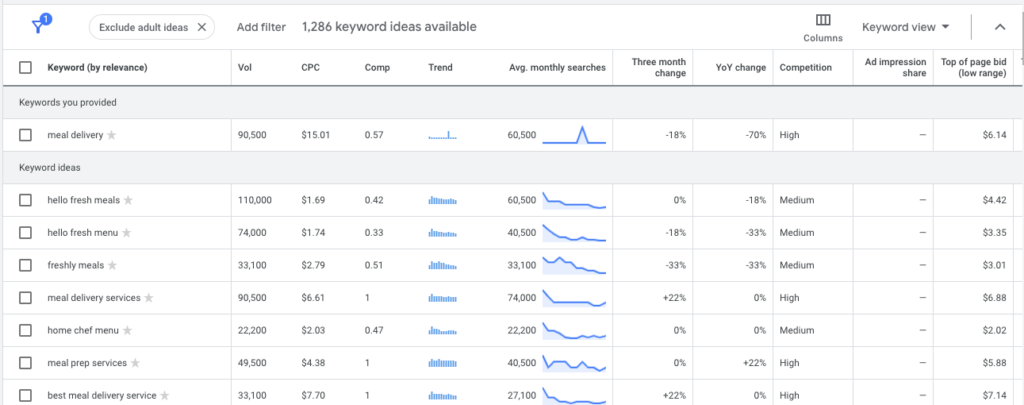
How to do keyword research
Step 1 – Start with a broad keyword and content ideas

All keyword research begins with a ‘seed keyword,’ a topic or idea related to your industry that you want to explore. Content ideas can come from almost anywhere, including:
- common client questions
- industry topics you’re an expert on
- online forums like Facebook groups and Reddit threads
- what your competitors are talking about
List any topics you feel you have the authority to write about. I almost always start more broadly when starting my research.
I start looking for more specific topic ideas as I’m searching. If I start with “how to cook a steak”, that might eventually lead to searches like “searing a steak” or “sear vs reverse sear”.
What I am trying to find are long-tail keywords (see Step 3) that have good search volume but less competition.
Step 2 – Begin analyzing keywords
There are a few key factors that can help you determine the best keywords to focus on.
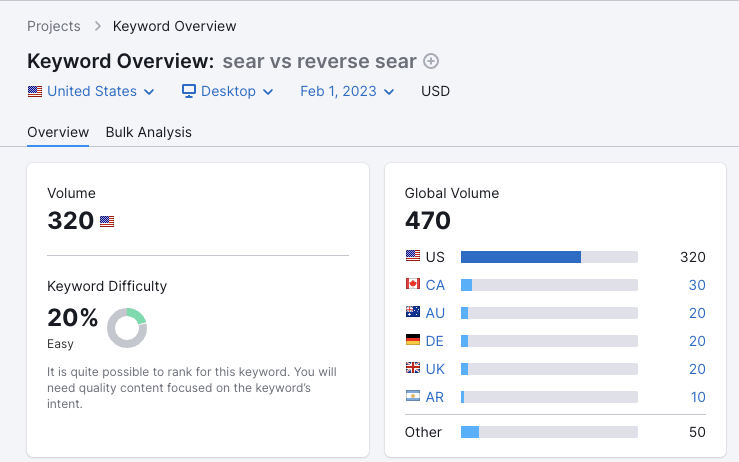
- Volume. It may sound counterintuitive, but targeting keywords with an extremely high search volume is almost sure to produce poor results. For most small businesses, the sweet spot of MSV isn’t in the tens of thousands (or, often, even the thousands), because a high search volume typically means going up against huge competitors.
Low-volume keywords are an extremely valuable tool in your content marketing. There may not be a huge number of people searching for that term, but people who are interested in the keyword are much more likely to fit the profile of your target client and take an immediate interest in your services.
- Competition. A keyword’s competitive score indicates how easily (and quickly) you’ll be able to rank in searches. The lower the score, the more likely you are to rank. Of course, you can rank well for keywords that have a higher difficulty score, just be prepared to put in the work to get there.
SEMrush has a helpful table that walks you through the probability of ranking for keywords with various difficulty scores.
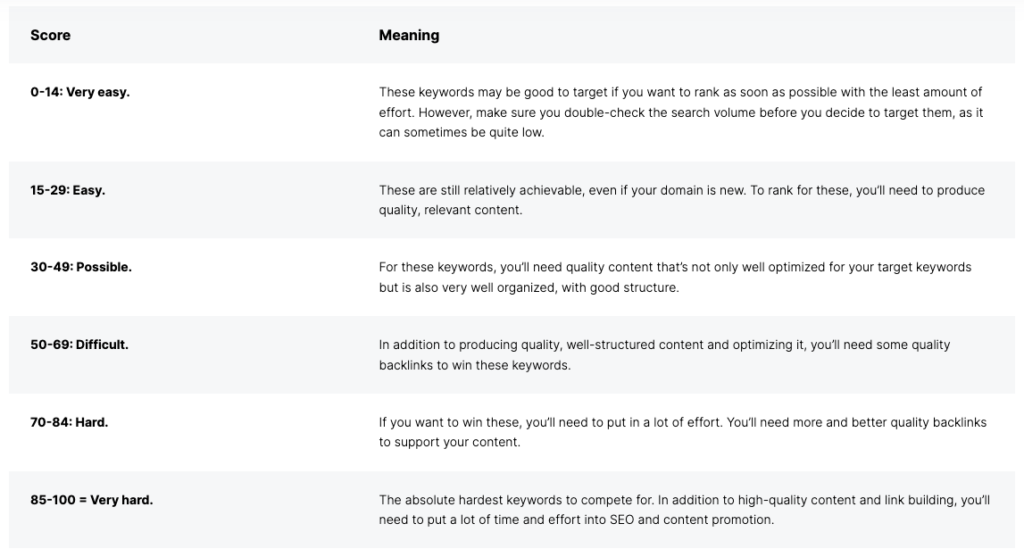
- Search intent. It is of critical importance to pay attention to search intent. Your page or post is much more likely to rank if the purpose of the page is congruent with the reason for someone’s search.
For instance, if I am searching sous vide vs. reverse sear, I am probably looking for an informational article that explains the difference between the two cooking methods. However, searching sous vide machine is a transactional search—in other words, I am looking to purchase a sous vide machine rather than read about sous vide machines.
The search intent for a given search will inform what kind of content you create or how you optimize content.
Step 3 – Determine what keywords you should focus on first
Once you’ve gathered data about your keywords you can start choosing keywords to focus on. If your goal is to rank in searches as quickly as possible, go for the low hanging fruit: keywords with a reasonable MSV and a relatively low difficulty score (think 30 or below).
Since one piece of content can target multiple keywords, pay attention to the related keywords and keyword variations. Are those topics/ideas that should be included in the same post or a different post?
See step 4…
Step 4 – Create keyword clusters
As I decide on a specific search to target, I pay close attention to related keywords/searches and start to create keyword clusters.
A keyword cluster is a group of keywords that reflect similar search intent or purpose. If you’ve ever searched a topic using several different word combinations, you know exactly what I’m talking about.
I use this keyword cluster to help outline my post. For instance, a post about creating a photography website probably also includes a section featuring examples/screenshots of photography websites.
A keyword cluster might look something like this:
- photography websites (seed keyword)
- photography website templates
- create a photography website
- best photography website builder
- how to create a photography website
- photography website examples
- photography website hosting
Keyword research tools provide lists of related keywords and keyword variations that can be helpful as you create your keyword clusters.
Something else that’s helpful is…
Step 5 – Conduct a competitive analysis
If you’ve decided on a topic, you should research the pages that already rank for that search. We always analyze at least the first page of results to better understand what content Google believes best meets search intent.
It is never okay to plagiarize. When analyzing the pages that currently exist, you’re looking at how the pages are structured, what kinds of questions they answer, and how long the page or post is.
If you’re looking for new keywords or searches to target, you can also use competitive analysis as a starting point. Many professional SEO tools will analyze a domain and provide reports on what keywords that site ranks for, its most popular pages, etc.
Keyword and Content Research Summary
Keyword research is at the heart of any strong content marketing plan. With a little effort and the right tools you can use content marketing to reach more people.
The amount of data that keyword research tools can provide might seem overwhelming at first. The key to effective keyword and content research is—like anything else—to practice it. You’ll learn a little more about what metrics matter the more you use a tool and publish content.
With time, you’ll create your own streamlined method of content and keyword research that works for you!
How to Optimize Your Showit Website
Interested in learning how you can implement your keyword research and optimize your Showit website for search engines? Check out our Simple Guide to Showit SEO or our Showit SEO course.
Showit has also published SEO resources here:
How to Write the Best Page Titles for SEO (And Your Audience!)
Blogging for SEO: It's Not as Scary as You Think! (webinar)


Davey Jones
Davey is CEO of BDOW! (a Showit company), the best tool for list building from your website. He's also a cofounder of the brand & website design agency 'Davey & Krista' and digital marketing agency 'Till Agency'.
